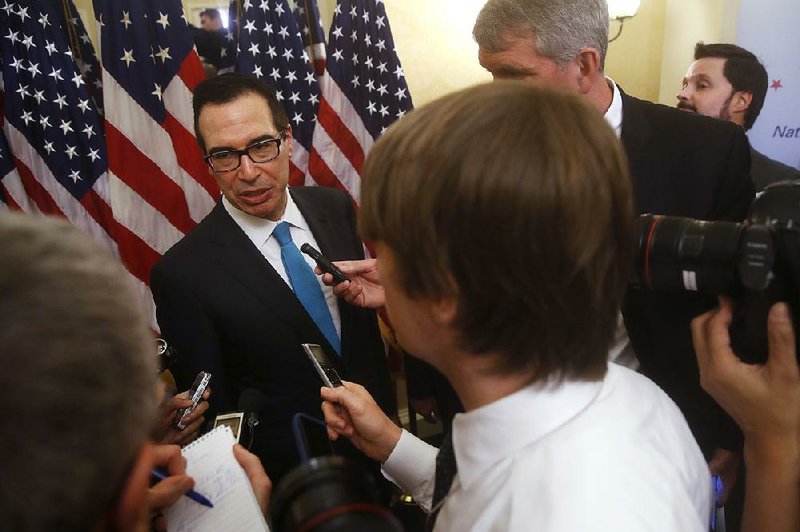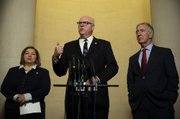WASHINGTON -- The Republican-led House Ways and Means Committee has beaten back Democratic efforts to keep the tax deduction for people paying state and local levies.
The panel voted 23-16 on party lines to reject the Democrats' amendments. They sought to restore the federal deduction for state and local income taxes that would be eliminated by the Republican legislation and to remove the $10,000 cap on the deduction for state and local property taxes.
The restrictions on the state and local deductions in the GOP tax plan have angered Republican lawmakers from high-tax states like New York and New Jersey.
Another Democratic amendment that would have shut down the plan's tax cut if it increased the $20 trillion national debt in two years also failed.
"What we are incurring is immense debt at immense cost to the American people just to benefit a handful of people at the top and some multinational corporations that don't believe in paying their taxes," said Rep. Lloyd Doggett, D-Texas.
House Republicans cited donor pressure as they rolled over Democratic objections.
"My donors are basically saying get it done or don't ever call me again," Republican Rep. Chris Collins of New York told reporters.
That prompted a pointed retort from Collins' fellow New Yorker, Democratic Rep. Joe Crowley.
"We know who's watching, we know who you're all catering to today," Crowley told Republicans as the Ways and Means Committee began a second marathon day of amendments and votes on the sweeping, nearly $6 trillion bill, which would be the first major revamp of the U.S. tax system in 30 years.
"We also know that it's been rumored that if you don't get this done you might as well give up the majority, because you ain't coming back in the majority," Crowley said. "And that's kind of sad that that's how we're going to be putting together a tax bill that affects so many people."
Republicans are seeking final action by year's end on the bill that's strongly supported by President Donald Trump as he and Congress' GOP majorities search for a legislative win they can take to voters next year.
Numerous issues were in play, including the precise levels for a mortgage-interest deduction, whether an adoption tax credit would be restored, and whether the legislation would serve as a vehicle to repeal the Affordable Care Act's requirement for nearly all Americans to carry health insurance. A repeal could raise more than $400 billion to help pay for the tax measure because the government would no longer be paying as much in Medicaid and Affordable Care Act tax credits.
Trump has called for repealing the individual mandate, but after a news conference Tuesday with congressional Republicans, Treasury Secretary Steve Mnuchin brushed aside a question about whether the president would accept a bill that didn't contain that provision.
"I'm not going to comment on that issue specifically. Again, the president wants to get a deal that will be signed," Mnuchin said.
"Nothing is more important to the president's economic agenda than tax reform and tax cuts," Mnuchin said.
Rep. Mark Meadows, chairman of the influential conservative Freedom Caucus, said "there's no way" the House tax bill will include a mandate repeal, since GOP leaders are concerned that could complicate the tax drive.
But the North Carolina Republican said House Republicans would gladly embrace the idea if the Senate were to add it. The GOP health bill collapsed in the Senate.
Republicans are working overtime to present their legislation as a boon to the middle class, citing beefed-up child tax credits and overall decreases in the tax burden across all income levels in the next several years. Democrats call it a gift to corporations and the wealthy, and point to a nonpartisan congressional analysis showing taxes would actually go up beginning in 2023 for some 38 million taxpayers or families making $20,000 to $40,000 a year.
A new analysis on Tuesday suggested tax cuts for lower- and middle-income taxpayers would fade over the course of a decade, more so than they would for high earners.
The analysis by the congressional Joint Committee on Taxation found that about 80 percent of tax filers earning between $50,000 and $75,000 would receive a tax cut from the bill in 2019. By 2027, just 60 percent of taxpayers in that same income group would see a tax cut. Of those earning more than $1 million, three-quarters would see a tax cut in 2019 and by 2027, two-thirds of millionaires would continue to see a tax cut.
The analysis could further complicate efforts by Republican leaders to forge ahead with a bill that is already under attack from Democrats and from business groups that say the legislation would disadvantage multinational companies.
Key groups began coming out in opposition to parts of the bill, including a proposed excise tax of 20 percent on payments made by U.S. companies to foreign affiliates. The provision is aimed at preventing U.S. companies from shifting profits abroad through payments, such as royalties, made to subsidiaries or other foreign affiliates.
U.S. multinational corporations are especially concerned about the proposal, which would raise just over $150 billion over a decade. They say the tax will wind up harming U.S. companies and their consumers.
House Ways and Means Committee Chairman Kevin Brady, R-Texas, said lawmakers "continue to make improvements at every step" and are working with multinational companies to address their concerns. "But make no mistake," he said, "we have to have safeguards in place so that companies aren't encouraged to shift their earnings and their profits offshore and to low tax havens, and we need strong guardrails to make sure they're not importing deductions, exclusions and other tax rate issues."
PUSHING THROUGH
Senate Republicans aim to introduce companion legislation by Thursday and to try to push a combined package through Congress and to Trump by Christmas. Trump made overhauling the tax system a campaign pledge and an economic promise.
The legislation would add $1.5 trillion to an already ballooning national debt as it delivers a major tax cut to corporations and repeals the estate tax, which would benefit a tiny percentage of the wealthiest families in the country.
It would collapse today's seven personal income tax brackets into four, nearly double the standard deduction used by people who don't itemize, and increase the child tax credit, an element championed by Ivanka Trump.
Senate tax writers are considering significant changes to the House tax bill, according to Republicans.
They would eliminate the deduction for state and local income, sales and property taxes. The House bill would let taxpayers deduct property taxes, limiting the amount to $10,000.
The Senate measure would retain the medical-expense deduction, which the House plan eliminates. And the Senate would retain today's seven personal income-tax brackets, not collapse them like the House bill.
The Senate bill also keeps the requirement that people buy insurance under President Barack Obama's health care law.
The measure was described by Republicans speaking on condition of anonymity to discuss internal deliberations. They said the provisions might change before the bill is released.
Information for this article was contributed by Marcy Gordon, Erica Werner and Andrew Taylor of The Associated Press; and by Jim Tankersley, Alan Rappeport and Thomas Kaplan of The New York Times.
RELATED ARTICLE
http://www.arkansas…">State consultant to sift sales-tax exemptions
A Section on 11/08/2017

